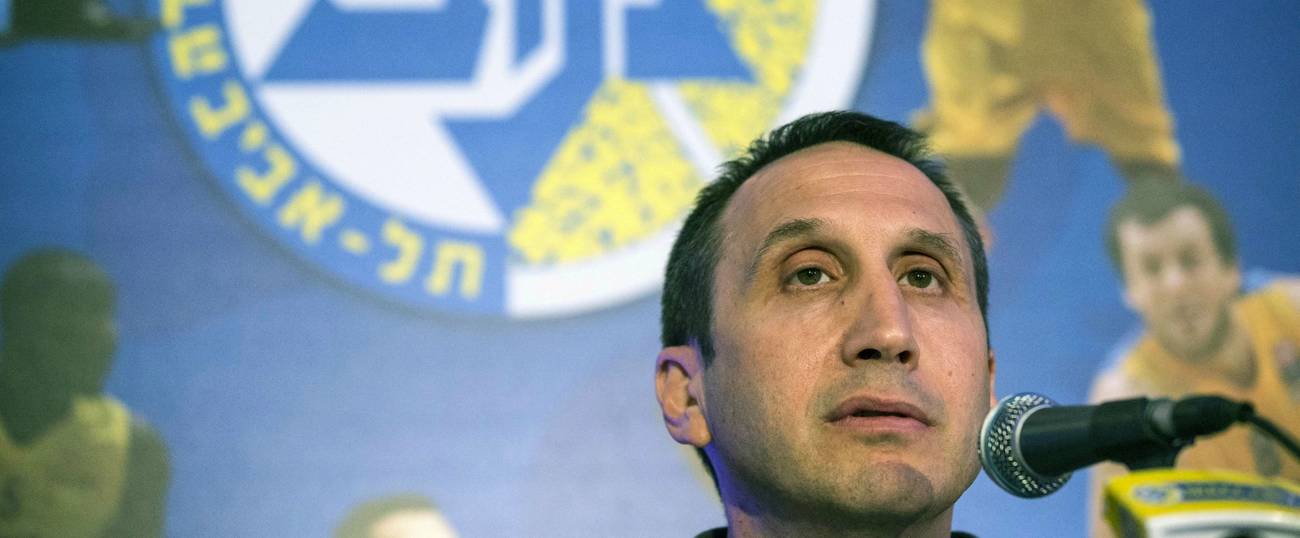Identity Politics on the Court, Part 2
‘David Blatt is a reminder that when you invoke one form of Jewish identity you, to some degree, invoke them all’




On Tuesday, when I wrote about David Blatt and anti-Semitism, I made only passing mention of Blatt’s politics. The former Cleveland coach is not only a friend of Israel; he is an enthusiastic supporter of the Likud and its standard-bearer, Benjamin Netanyahu.
I was almost immediately accused of ignoring this as an obvious explanation for the Palestinian flag in the stands of Quicken Loans Arena: When a Likud-leaning Israeli who has condoned attacks on Gaza loses his job, of course it’s cause for celebration for anyone who would bring a Palestinian flag to an NBA game—a form of geopolitical theater common at soccer matches but virtually unheard of in this sport. According to the most extreme version of this logic, Blatt wasn’t being singled out as a Jew, an Israeli Jew, or a figurehead for the Jewish state of Israel; he was targeted specifically for the beliefs he subscribes to as an individual.
I still believe that the hysteria in the Israeli press over David Blatt’s firing was misplaced, and was at best a misreading of the situation. The Cavaliers had every reason to dismiss Blatt, and while there was much about the situation that could be read as anti-Semitic, all signs points clearly back to Blatt himself and his performance on the sidelines. And it’s entirely possible for a Jew to be an asshole without him being a Jewish asshole; there’s simply no credible reason to presume that anyone involved in the decision—whether it was LeBron James, GM David Griffin, or landsman owner Dan Gilbert—was viewing Blatt as a category and not an individual.
What makes the flag incident different is that, even if Blatt was being castigated for his individual choices, it wasn’t really personal. David Blatt was representative of something larger than himself: A stance on Israel and Palestine that is considered inflammatory in some corners. Maybe it’s just a matter of policy. Yet while I can talk about being Jewish without bringing Israel into the picture, I find it utterly impossible to discuss Israel while ignoring its Jewish identity—or the broader, murkier concept of Jewish identity. David Blatt is a Likud-leaning Israeli who has condoned highly controversial policies and actions. In the American context, though, he’s a son of Massachusetts and the only Jewish coach in the unofficial sport of American Jews. These boundaries are more fluid than we think. Blatt may have been called out as a certain kind of Israeli but he’s also a certain kind of Jew, one that made it hard for me to not feel something when I saw the flag.
My feelings about Palestine are beside the point here, as is the unknowable intent—for lack of a better word—of the protestors. We’re back in familiar, if eternally unsettled, territory: Does the notion of a Jewish state practically demand, or force, some form of unity upon all Israelis? Are Israelis a nationality or a strain of the ethno-religious category of Jews? Does acknowledging Israel’s right to exist make someone into a Zionist? Does becoming Israeli mean no longer identifying as Jewish in the more general sense? Does it negate the diaspora? How about one’s roots in another country? There are no easy answers here and very quickly, categories start to collapse; Jews know this and so does anti-Semitism. There’s a reason why Islamist groups don’t just hate Israelis on the right, or Israelis, but instead opt for blanket anti-Semitism, despite the fact that there’s little historical basis for this broad-based beef.
That’s why I closed with the thought that maybe we should have cared more about David Blatt. Not because he was a source of pride in the same way he was for the Israelis who could claim his history as their own but because in Blatt I saw how easily someone I could not give two fucks about could so suddenly become a point of identification. David Blatt is a reminder that when you invoke one form of Jewish identity you, to some degree, invoke them all. This wasn’t enough to make me root for him. But like I said, now I feel like I should’ve been paying more attention. Not for his sake, but for my own.
Previous: Identity Politics on the Court
Bethlehem Shoals is a founding member of FreeDarko.com. He has contributed to GQ, Salon, and Slate. Follow him on Twitter @freedarko.